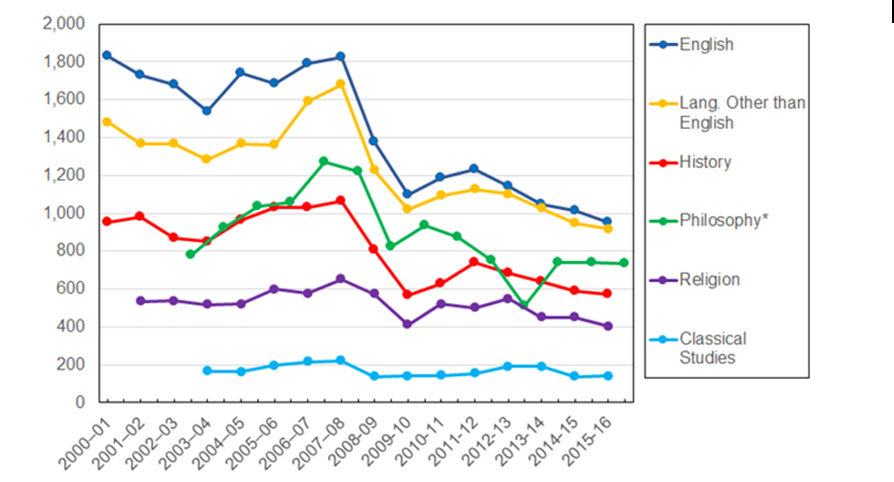You have /5 articles left.
Sign up for a free account or log in.
Many new Ph.D.s in humanities disciplines report that they struggle to find academic jobs, and that many of the positions they find available are off the tenure track.
Data released Sunday night by the American Academy of Arts and Sciences show that these anecdotes reflect realities in a wide range of humanities disciplines. And the data show that Ph.D. production in these fields is up, suggesting that the job shortage won't go away any time soon.
The data are part of the academy's Humanities Indicators Project, which is regularly updated with new analyses -- many of which alarm academics in the humanities, even as they applaud the availability of the data.
Those Entering the Job Market
One analysis released Sunday looked at completions of doctoral degrees. Humanities programs awarded 5,891 doctoral degrees in 2015. That is the largest number recorded back to the start of collection of such information in 1987. The figure was 3,110 in 1988, then rose steadily to 4,994 in 2000, dipped to about 4,700 from 2002 to 2007, and then started going up again, year after year.
The long period of time it takes to earn humanities doctorates (8-10 year time-to-completions are not uncommon) means that prospective graduate students must take a long view in terms of thinking about likely job prospects when they finish. But the steady increases in Ph.D. completions since 2007 cover a period of sharp job cuts when the economic downturn started in 2008, slight improvements a few years later (but not to pre-downturn levels) and more reductions in positions since then.
While many colleges rely on humanities departments for general education, and especially for first-year composition, they increasingly use adjuncts, not tenure-track professors, for such instruction. It would be hard to say that at any point since 2007 has the job market in the humanities been healthy. And while many humanities groups are encouraging Ph.D.s to seek jobs outside academe, the primary motivation for seeking a Ph.D. in the humanities continues to be an academic career.
As the chart below shows, history and non-English languages have seen slight declines in new Ph.D.s in recent years, most others are going up.
Doctoral Degree Completions in Humanities, by Discipline, 1987-2015

For master's degrees, the analysis found a decline in new degrees awarded. Humanities fields conferred 28,253 master’s degrees in 2015, the third consecutive year of declines and an 11 percent reduction from the number awarded in 2012, the recent high point. Even with the recent declines, however, the number of master’s degrees conferred in 2015 was still higher than in every year from 1987 to 2007.
Another analysis released by the academy looks at the make-up of the new doctoral population by race and ethnicity. In 2015, the share of humanities doctorates completed by students from traditionally underrepresented racial and ethnic groups was 10.5 percent, four percentage points higher than the level in 1995. While that growth may cheer those hoping to diversify the humanities faculties in American higher education, it came at a time that available jobs were disappearing.
Where Are the Jobs?
As doctoral production continues to accelerate in the humanities, jobs are increasingly hard to come by.
Another analysis by the academy looked at the data from disciplinary associations in humanities fields that post or collect job postings. While these associations aren't the only places that list jobs, they are generally considered to reflect the trends in their fields.
Number of Job Postings With Humanities Disciplinary Associations, 2000-16





